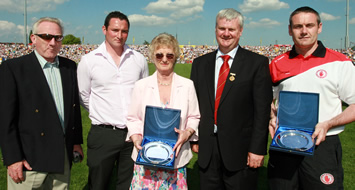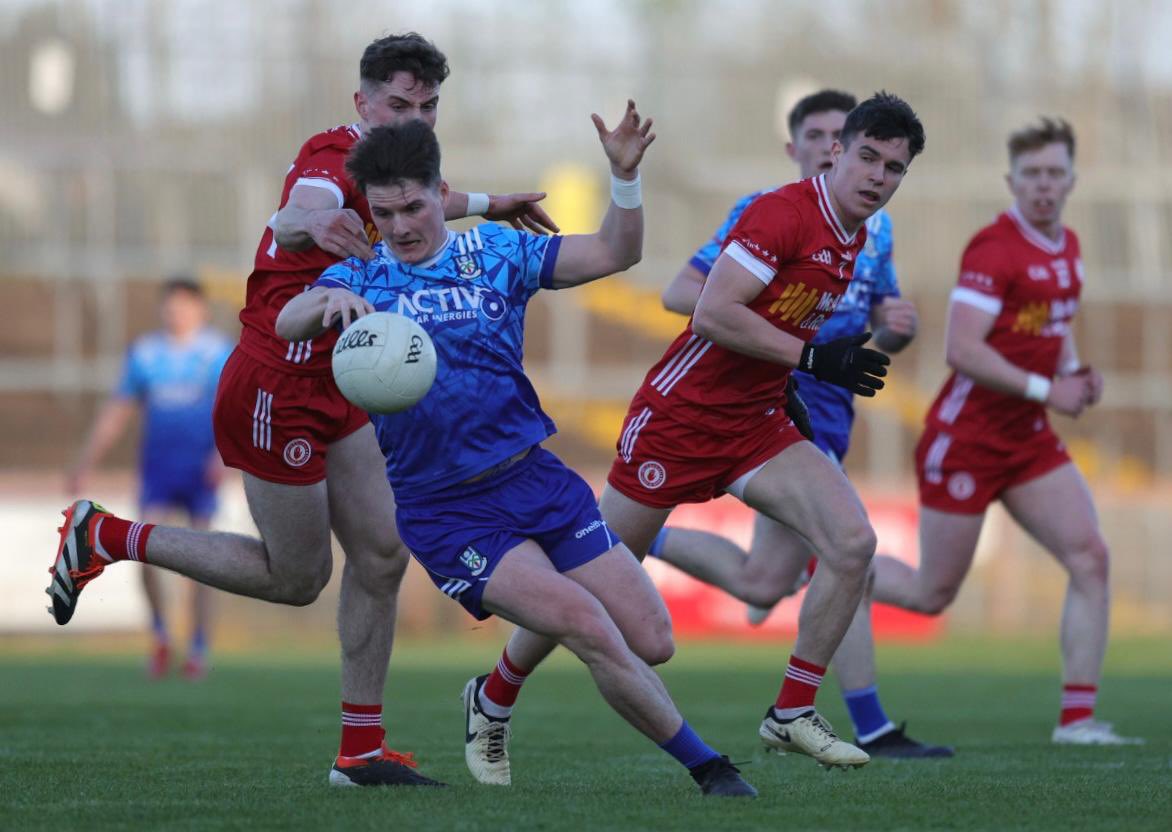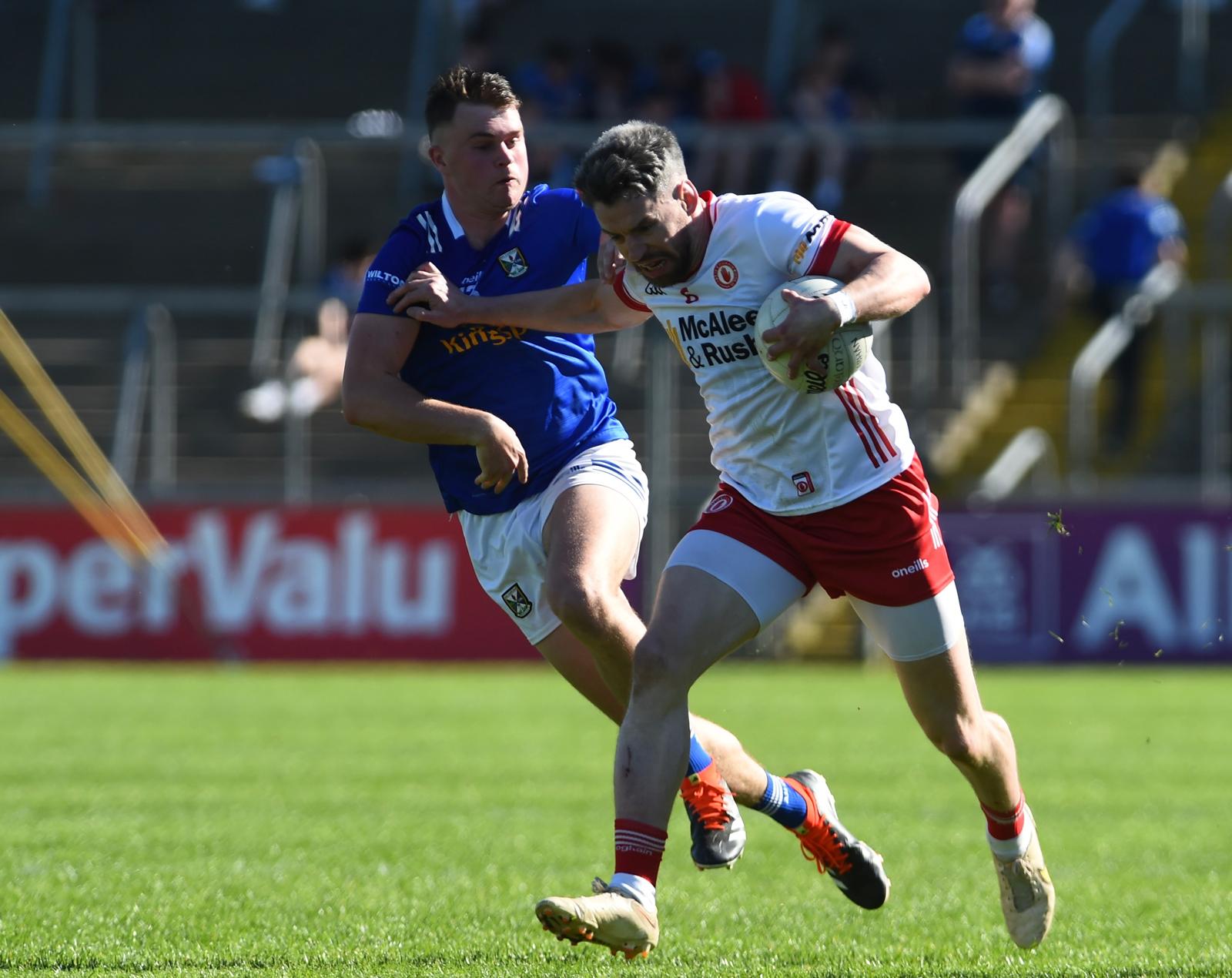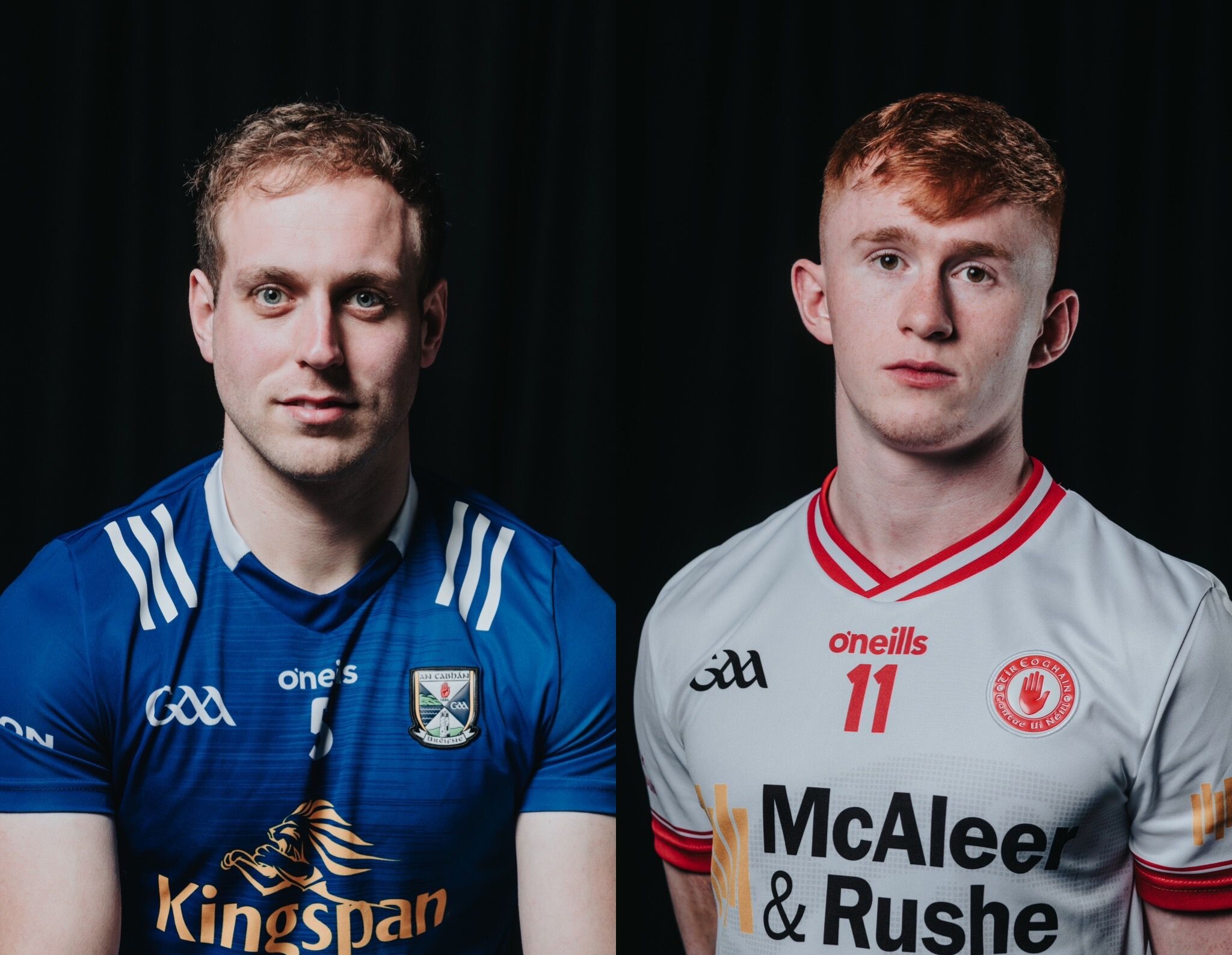Founding Fathers Honoured
 On Sunday at Casement Park, Comhairle Uladh honoured two of its founding fathers: Michael V. O Nolan (Tír Eoghain) and George Martin (Aontroim), the first Leas-Uachtarán and Uachtarán respectively.
On Sunday at Casement Park, Comhairle Uladh honoured two of its founding fathers: Michael V. O Nolan (Tír Eoghain) and George Martin (Aontroim), the first Leas-Uachtarán and Uachtarán respectively.
Rugadh Micheál B. Ó Nualláin in aice leis an Ómaigh, sa bhliain 1875. Bhog a mhuintir go Béal Feirste nuair a bhí sé óg. Sna 1890idí d’fhreastail Micheál ar Choláiste Naomh Maelsheachlainn agus ar Ollscoil na Banríona, áit a cáilíodh é le B.A. sa Léann Clasaiceach. Ceapadh é oifigeach cánach sa státseirbhís i 1897. Timpeall 1900 bhog se go dtí an Strath Bán. Chuaigh sé isteach i gConradh na Gaeilge, agus mar a dúirt a mhac Ciarán, ‘chaitheadh sé na hoícheanta ag múineadh Gaeilge, sa bhaile féin agus i dtrí nó ceathair d’áiteanna eile’.
A Gaelic idealist, through his painstaking work as a múinteoir and organiser for the Gaelic League around Strabane, outlined above, M. V. O Nolan became engrossed in the work of the GAA. In Strabane district he led a revival of Gaelic games, particularly hurling, of which he was a capable player and referee. Chiefly due to him, Tír Eoghain team (of Strabane players) fielded in the 1903 Ulster Hurling Championship, a year before the county did so in football.
In March 1903 O Nolan was elected as inaugural Leas-Uachtarán of Comhairle Uladh in Armagh. In January 1904 he was elected as the first Cathaoirleach of Tír Eoghain County Board in Dungannon. Then in April he was elevated to Uachtarán of Comhairle Uladh. During his tenure, the Council promoted hurling and football with equal vigour. O Nolan himself was the leading hurling referee in the province, taking charge of the Ulster finals of 1903, 1906 and 1907, and numerous other games. He made huge sacrifices for county and province, often riding a bicycle from Strabane to attend meetings, or not claiming other travelling expenses.
After he married Agnes in 1906, O Nolan was not able to attend as many GAA meetings. It hindered him that the county board usually met in Omagh or Dungannon, and increasingly Comhairle Uladh meetings were held in south Ulster venues like Clones, despite his pleas for more central venues. Absent from the 1908 Ulster Convention, O Nolan was replaced as Uachtarán by Patrick Whelan (Muineachán), but was then elected as a provincial Leas-Uachtarán (and again in two subsequent years). In 1909 he retired as Cathaoirleach of his county board.
He stayed in Strabane until about 1912, when he moved with his family to Glasgow. His work as an excise officer took them to Dublin in 1915 and thence to Tullamore in 1920, before returning to Dublin in 1923 when he secured a senior position in the civil service. He had twelve children, one of whom, Brian, was the famous writer ‘Flann O’Brien’/‘Myles na gCopaleen’, who was recently referenced in the TV series Lost!
M. V. O Nolan took no part in the GAA after leaving Comhairle Uladh. He died in July 1937, and is buried in Deansgrange Cemetery. His last remaining son, Micheál, is present at the game today, accompanied by his wife, Ann.
—
George Martin was born in 1877 in Belfast. He attended the C.B.S., Divis Street, and became an apprentice solicitor with David McGonigal and Sons. He first joined the GAA through the Tír na nÓg club, an offshoot of a Conradh na Gaeilge branch. He played little if any, but rapidly made his mark as an official.
On 22 March 1903 Martin travelled to the foundation meeting of Comhairle Uladh in Armagh as an Antrim delegate, and, at just 25 years old, was elected as its first president. For the next seven years his spare time was completely absorbed in GAA work. Inside twelve months, he presided over half a dozen Ulster Council meetings; refereed several Belfast club games and Ulster Championship games; chaired three meetings of Antrim County Board and was elected as its treasurer; and attended the meetings to form Emmet’s GAA Club, Dungannon, and the Tyrone County Board.
At the 1904 Ulster Convention, in 3 St Paul’s Terrace, Belfast – his residence – Martin was elected as provincial secretary. It was an onerous task, with so many clubs and counties starting to affiliate and learn the ropes. Few were the weekends when he was not travelling around the province to matches or meetings, often with little or no help. As time passed, his other duties multiplied. In 1907-09 he was Antrim’s representative on the Central Council; having served as county treasurer since 1904, he was elected vice-chairman of Antrim in 1908, and chairman in 1909; and he was on the national GAA Athletic Council, acting as a handicapper around Ulster.
Comhairle Uladh had no treasurer per se then, so the heavy financial burden fell to Martin. Due to the unavailability of special trains on Sundays in the north, the popularity of other sports, and a dire lack of suitable grounds, crowds for inter-county games in Ulster were very small, and repeatedly the Council recorded losses. Martin criticised the Central Council’s reluctance to send funding north, where it was most needed. There were other drains on resources too: in 1909 Martin represented the Council in a prosecution case at Carrickmacross, against a man who took £3 from championship gate-receipts and pleaded that the GAA owed him that amount! Moreover, objections and appeals sapped much of the Council’s energies. Ulster conventions usually lasted six or seven hours! Martin’s reports as secretary lamented how ‘bickerings, petty jealousies and strife’ dogged their endeavours. ‘We in Ulster have enough to fight when we met the common enemy without fighting amongst ourselves.’ He was a staunch nationalist, and argued against ‘truckling with the Garrison’ – i.e. the GAA’s rival athletic bodies in the north.
Martin made incredible sacrifices for Comhairle Uladh. Several times he paid teams’ travelling expenses from his own pocket – such as £10 to Antrim in 1908 – without proper refund. ‘Only for Mr Martin we would be done years ago,’ stated an Armagh delegate in 1909. In that year, his work took him to Dundalk, and he promptly resigned from the Antrim County Board. Then, in February 1910, Martin, the sole remaining founder of Comhairle Uladh, was forced to step down as its secretary, due to work and impending marriage. The Council owed him almost £19 for personal expenses, but he left on good terms, saying that ‘if at any future time they were in a position to pay him £15 they could do so, and if not it did not matter’.
In August 1910 Martin married Teresa (née Dempsey) in St Paul’s Church, Belfast. They moved to Drumcondra, Dublin, and their first daughter was born in 1911. George qualified with the Incorporated Law Society of Ireland in 1912. While working in Ballyjamesduff in 1915, he was appointed as a Commissioner for the State of New York. In 1918, after a stint in Oldcastle, he returned to Belfast and set up his own practice on Royal Avenue, later moving to Garfield Street and then Arthur Square. In 1922 he was appointed to the northern state’s short-lived Belfast Conciliation Committee. He was an expert in bankruptcy, and became prominent in Incorporated Law Society of Northern Ireland. He worked on various important cases, such as the successful defence of Col. Seamus Woods of the Free State Army against a murder charge in 1924. Though not a GAA official after 1910, Martin acted as legal representative for the Antrim County Board in the 1920s, and lent support to the development of Corrigan Park. He died at home in South Parade, Ormeau Road in 1934, being survived by his widow and four children.
In 2009 Comhairle Uladh put a plaque on George Martin’s grave in Milltown Cemetery, during its 125-year celebrations. Some of his grandchildren are in attendance today.
Article compiled by Dónal Mac An Ailín, Cardinal Ó Fiaich Library.
—
Pictured in the attached Photograph is
L-R: Neill Colgan, Gerard Laverty, Aine Colgan, Uachtarán Chomhairle Uladh Aogán Ó Fearghail and Ciaran McLaughlin.
Aine is the Granddaughter of George Martin and Neill is her husband.
Gerard Laverty is the Great Grandson of George Martin.
Ciaran McLaughlin, Tyrone GAA Chairman, collected the presentation on the day on behalf of the family of M.V. Ó Nolan.







